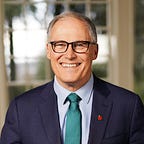Gov. Inslee signs supplemental budgets that boost behavioral health and K-12 education funding
The final budgets built on the successes of the 2023–2025 biennial budget, notably increasing funding for behavioral health treatment and K-12 education.
Gov. Jay Inslee today signed 19 behavioral health policy bills and the 2024 supplemental capital and operating budgets. The signing ceremony took place at the University of Washington’s first-in-the-nation teaching hospital for doctors and nurses embarking on careers in integrated behavioral and physiological health treatment. The new facility will include capacity for 150 patients when it opens this spring.
The new UW building is part of a strategic plan to make behavioral health treatment more widely available across the state. The state is opening new facilities that offer hundreds more beds to patients in need of specialized services with a focus on community-based care.
“This budget provides steadfast support for programs and services that Washingtonians rely on in their day to day lives,” Inslee said. “We’re creating capacity for more behavioral health treatment options. We’re building more schools and hiring more support staff for teachers. We’re reducing homelessness and adding to last year’s historic investments in housing. We’re fending off the deadly scourge of fentanyl, bolstering public safety, and slashing air pollution.”
Education investments
On education, the capital gains tax and the Climate Commitment Act are providing Washington significant new sources of funding for investments in schools across the state.
The supplemental budget raises the cap on special education funding to meet districts’ increasing needs. It increases funding that schools can use to hire more educators, prevent layoffs or raise salaries for support staff. And it funds renovation and construction projects to make schools more energy-efficient and improve filtration systems that better protect children’s lungs from increasing incidents of wildfire smoke.
The supplemental budget also includes funding to make sure every student from grade school through college in Washington understands how deadly fentanyl is.
Boosting the housing supply for people with disabilities and for low-income communities
The Legislature also built on the historic investments made in affordable housing last year, by appropriating an additional $175 million into the Housing Trust Fund. This money will fund the construction or acquisition of nearly 2,000 more units. Legislators also boosted funding for housing for people with developmental disabilities.
These investments will keep the state on track to build the meet the projected of 1.1 million necessary additional homes to keep pace with population growth over the next 20 years.
As affordable housing comes online, the encampment resolution program continues to make progress to address homelessness. In its first 18 months, the program has resolved more than 30 encampments and brought more than 1,000 people inside to safer shelter.
Leading on climate action
Maintaining Washington’s position as a “supernational” leader on climate, the Legislature is also making big investments in building the clean energy economy and slashing pollution. That includes spending $3.2 billion from the Climate Commitment Act. Climate, environmental and conservation programs funded in the supplemental capital and operating budgets include:
- $255 million to reduce energy costs for low-income families with through weatherization programs and subsidized clean energy retrofits, subsidized heat pumps and solar panels
- $150 million for energy vouchers for low and middle-income families
- $55 million to make affordable multifamily housing more energy efficient and to lower heating bills and electric bills for residents
- $35 million to advance emerging clean energy technology, like advanced nuclear and hydrogen fuel
- $35 million to electrify ports and keep the air in nearby communities cleaner
- $3.7 million to finish developing the Nisqually State Park, in partnership with the Nisqually Tribe
Strengthening Washington’s standard for behavioral health
The governor also signed a series of health policy bills. The new laws broadly aim to expand access to behavioral health treatment services, increase recruitment for health care providers, and bolster funding to hospitals. Highlights include:
- HB 1851 provides for training health care providers so they can offer earlier interventions for people with behavioral health issues in schools and primary care settings
- HB 2348 provides additional funding to Harborview Medical Center, a vital safety net for the state and region with Washington’s only level 1 adult and pediatric trauma center
- SB 6308 and HB 2088 improve the implementation strategy for the state’s crisis care system including the 9–8–8 crisis hotline, by planning to increase the services available to callers and training for first responders to appropriately handle behavioral health crisis calls
- SB 5853 enables more 23-hour crisis centers to provide behavioral health care and substance use treatment to youth in crisis
“Over the last seven years I have been proud to lead our tremendous progress establishing services across the behavioral health crisis continuum,” said Sen. Manka Dhingra, chair of the Senate Law & Justice Committee. “The legislation Gov. Inslee is signing into law today builds on that work at each of the three critical points: a place to call, someone to come, a safe place to be. This legislation bolsters the technology of 988 call centers, ensures regional coordination among crisis responders, expands crisis relief centers to treat young people, and removes barriers to access for substance use treatment.”
Inslee also signed bills related to coordinating mental health care with housing providers, recruiting additional health care workers to the field and easing the burden of student loan debt for behavioral health clinicians. They include: SB 6106, HB2320, HB 5184, SB 6308, SB 5790, SB 6228, SB 6251, HB 1946, HB 2247, SB 5588, and SB 5660.
